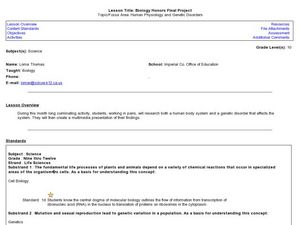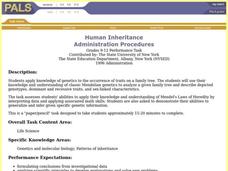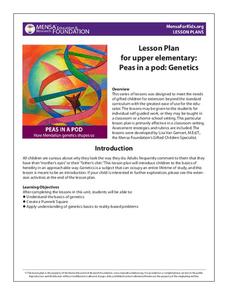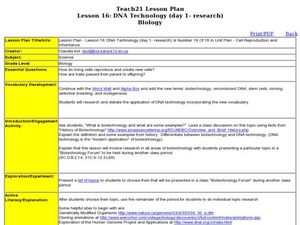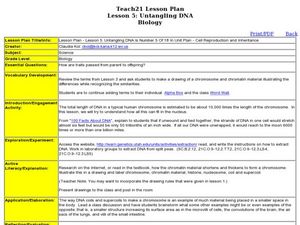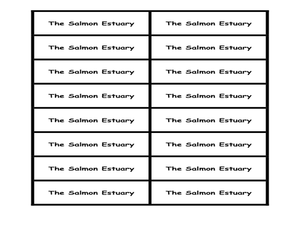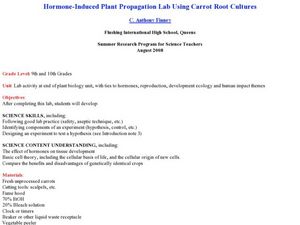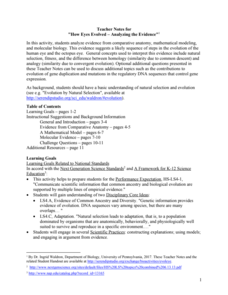Curated OER
Variation in Human Skin Color
Young scholars classify themselves according to the six skin types. In this biology instructional activity, students explore the causes of human skin variation. They present their findings in class.
Curated OER
Biology Honors Final Project
Tenth graders work on a project about cellular biology and genetics. In this biology lesson, 10th graders research about the assigned human body system and genetic disorders that affect it. They create a multimedia presentation and...
Curated OER
Human Inheritance
Students analyze genetic characteristics in a given family tree through the F2 generation. Students apply prior knowledge from Gregor Mendel's study with pea plants and his Laws of Heredity to answer questions.
Curated OER
Diploid Genetics and Chromosomal Inheritance
Given the phenotypes of offspring in mice, flowers, and human blood type, genetics pupils practice determining the genotypes of the parents. Four short answer questions follow. The entire assignment will require learners to put on their...
MENSA Education & Research Foundation
Peas in a Pod: Genetics
Can peas have grandparents? Learn about inherited traits and heredity with a set of activities focused on Mendelian genetics. As your class learns about the process of passing traits along in Punnett squares, they take on the role of...
Curated OER
The Cell Cycle
In this biology learning exercise, learners label 9 diagrams with the correct names. They also write short answers to 6 questions that follow.
Curated OER
Lesson 16: DNA Technology
Students research different areas of biotechnology. In this biology lesson, students create a presentation about their research. They debate the topic presented and share their views on the subject.
Curated OER
Lesson 10: Karyotypes
Students predict traits of future offspring. In this biology lesson, students study karyotyping to predict genetic disorders. They research an assigned karyotype and present information about it.
Curated OER
Lesson 5: Untangling DNA
Students extract DNA from split peas. In this biology lesson, students research how chromatin form into chromosomes. They draw the stages and present their work in class.
Curated OER
The Salmon Estuary And Human Impacts
Students have discussions and complete activities about the pacific salmon life cycle and marine parasites. In this salmon lesson plan, students complete activities such as observing sea lice, playing a tag game, and a board game.
Curated OER
Human Heredity Vocabulary
Ninth graders review the terms "aneuploidy," "fetus," and "karyotype" in this vocabulary worksheet, which includes three multiple choice questions about each term. This activity could be expanded into a more developed vocabulary lesson...
Curated OER
Evolution worksheet
Looking at evolution in detail, this thorough learning exercise has complex questions requiring details and explanations of natural selection and diversity. Various examples of biological characteristics are available, and students...
Curated OER
Fungi
Why did the mushroom go to the party? Because he was a fun guy! Biology learners study fungi while completing this learning exercise. Structure is compared to that of other life forms. The life cycle is displayed with colorful diagrams...
Curated OER
The Effects of "Recreational" Drugs on the Development of Chick Embryos as a Model for Human Embryogenesis
Students conduct experiments on fertilized chicken embryos to determine the possible developmental effects that various recreational drugs (caffeine, alcohol, nicotine, and aspirin) might have on them.
Curated OER
Hormone-Induced Plant Propagation Lab using Carrot Root Cultures
Young scholars evaluate the importance of hormones in living things. In this biology lesson plan, students experiment on carrots to differentiate how humans and plants reproduce. They collect data from experiment to answer analysis...
Curated OER
Nucleic Acids: information storage
This sequence of slides covers each main macromolecule that is involved with human structure and function. The history of nucleotide research and the way that they are formed is summarized, a diagram accompanies the explanation. The main...
Curated OER
Survival in Antarctica
Explore the harsh climate of Antarctica and its wildlife. Participate in experiments to determine how humans survive in the continent's climate, and address the difficulties faced by scientists.
Serendip
How Eyes Evolved – Analyzing the Evidence
Octopodes existed for hundreds of thousands of years before humans, yet our eyes share many similarities. Scholars analyze the evidence to determine if the evolution of eyes best fits a homology or analogy model. They discuss the issue...
LABScI
Population Dynamics: The Predator-Prey Lab
Wolves eat better when the bunny population increases, but how long does that last? A series of 12 biology lessons uses the sixth installment to explore the predator-prey relationship between bunny and wolf populations. Young scientists...
Curated OER
Populations – The Survival of the Fittest (Part 1)
Young scholars explain in their own words why organisms live together. In this biology activity, students model what happens to organisms if their environment changes. They explain the importance of evolution.
Curated OER
A Clone of Your Own: The Legal Issues and the Future of Genetic Engineering on Humans
Twelfth graders define cloning in their own words and examine the different types of cloning. After reading an article, they summarize it in their own words and use the internet to research the history of cloning. In groups, they...
Curated OER
Termite Biology
Students explore the physical characteristics, distribution and habitat of termites. The lesson focuses on the termite as a social creature contrary to most other insects.
Curated OER
Zebrafish Development
Students examine the early development of zebrafish as a model for embryo development in humans. They observe various stages of zebrafish reproduction from sperm and eggs to fertilized eggs and hatchlings.
Curated OER
Pets: Oh Behave
They say that a dog is a man's best friend. Why is that? Discuss with your class why people like pets and the responsibilities with owning one. They read an article about pet behavior and write a short essay comparing one of their...



